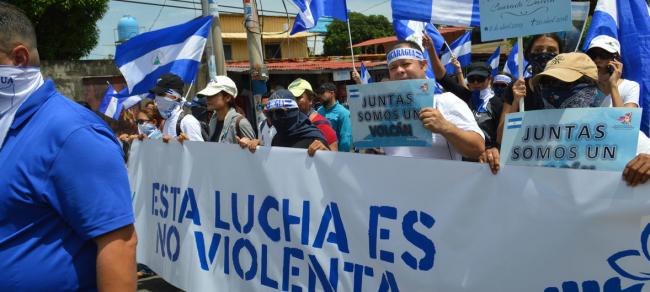
Nicaragua must end demonstrator killings and seek a political solution in wake of ‘absolutely shocking’ death toll: UN chief
New York, July 18 (IBNS): The United Nations Secretary-General has called on the Nicaraguan Government to end violence against demonstrators which has cost an estimated 280 lives, and begin a national “political dialogue” to end the crisis which has gripped the country for nearly three months.
Speaking in neighbouring Costa Rica on Monday night, António Guterres said that it was “an essential responsibility of the State to protect its citizens, and this basic principle cannot be forgotten, especially when, unfortunately, we have a death toll that is absolutely shocking.”
At least 12 people were killed over the weekend, mostly as police and paramilitary supporters of the government confronted demonstrators who have been protesting proposed reforms to the pension system across the country, since 18 April. Protesters are demanding that the long-serving President, Daniel Ortega, step down.
The UN chief told reporters on Monday that “it is essential that violence must stop immediately and that the political dialogue, the national dialogue, be revitalized because only a political solution is acceptable for Nicaragua.”
Guterres said that he was “not a supporter of simplistic analysis of complex problems, but there is one thing that is obvious: there is a death toll that is shocking due to the use of force on the part of entities linked to the State, that is not acceptable.”
His words were amplified by the UN human rights office, OHCHR, on Tuesday in Geneva, where spokesperson Rupert Colville noted the “increasing climate of fear and mistrust” in the country and called for protesters’ safety to be guaranteed, along with their right to freedom of expression.
“The appalling loss of life must stop – now,” he said. “The violence is all more horrific as armed elements loyal to the government are operating with the active or tacit support of the police and other state authorities.”
Of those who lost their lives protesting at the weekend, two died when shots were fired at the Divina Misericordia Church in the capital, Managua, where student demonstrators had sought refuge after the university they had been occupying came under attack.
Of those killed in the demonstrations to date, at least 19 were police officers, Mr. Colville said, adding that the police, along with pro-State armed groups, have forcibly removed barricades erected by demonstrators and communities in so-called “clean-up operations”.
Amid reports that demonstrators have been subject to numerous rights violations including torture and extrajudicial killings, the OHCHR spokesperson said there are growing concerns that violence will intensify as Nicaragua prepares to mark Liberation Day on Thursday, 19 July – the date marking the overthrow of the Somoza regime in 1979 by the Sandinistas.
“We are expressing the concern that it could get worse,” Colville said, explaining that the initial spark for the demonstrations was proposed pension reforms which evolved into wider discontent at President Daniel Ortega’s Government.
Dismissing Government claims that the demonstrators were intent on regime change, the OHCHR spokesperson added that there was “no united opposition” and “no armed opposition”.
“It’s certainly not an insurrection at this point,” he added, “even though those accusations are being made by the authorities”.
Loosely worded anti-terror legislation passed on Monday by Congress also represented a potentially worrying threat to freedom of expression, Colville insisted.
He pointed to the “very loose wording” of Article 394 and its definition of a terrorist as someone who causes death or injuries or destroys public or private property.
“It’s this very loose wording which lays itself open to interpretation which could include people who are simply exercising their right to protest,” the OHCHR spokesperson said.
There are also concerns that human rights defenders have been subject to enforced disappearance, including Medardo Maireno and Pedro Mena.
According to OHCHR, police detained them on Friday at Managua airport and their families have not been told where they are, despite judicial requests.
Artículo 66
Support Our Journalism
We cannot do without you.. your contribution supports unbiased journalism
IBNS is not driven by any ism- not wokeism, not racism, not skewed secularism, not hyper right-wing or left liberal ideals, nor by any hardline religious beliefs or hyper nationalism. We want to serve you good old objective news, as they are. We do not judge or preach. We let people decide for themselves. We only try to present factual and well-sourced news.







